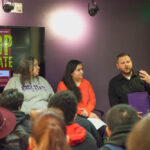
‘What are you?’
It’s a simple question, but it can be insensitive when asking about someone’s ethnicity.
It’s a part of a new phenomenon known as colorblind racism, where racial bias is disguised under language that justifies inequality, such as: “some of my best friends are black” or “everyone should be treated equally”.
Colorblind racism, along with implicit bias, where racism is unintended and unconscious, but present in our thoughts of how people should be or act.
“Stop the Hate: Racism in the 21st Century” discussed these issues of contemporary racial disparity in the U.S. as a panel, and how we can address them.
“Open racism is seen as morally wrong,” said Dr. Pepper Glass, a professor of sociology at WSU. He referred to old racism, or Jim Crow racism, where bigotry and hatred were open and common place. “New racism is made of more hidden and unconscious actions.”
New racism is based on culture, cultures that seem inferior because of parenting styles, language differences and work ethic.
These implicit biases are something everyone has, and some groups are trying to change these biases.
According to Glass, the Salt Lake Police Department explicitly teaches against implicit violence because people are statistically more likely to react violently about black people.
Beyoncé caused a stir at this year’s Super Bowl for her halftime performance that contained elements about black pride and the Black Lives Matter movement. Some were shocked because Beyoncé wasn’t seen as ‘being black’ until this performance.
“I think people feel that talking about racism perpetuates racism,” Glass said.
Are we allowed to talk about racism?
Bahar Alimadadi, a senior studying medical laboratory science, faces a different type of racism in her life.
“I was always identified as a latino; people always thought I spoke Spanish.”
Alimadadi’s parents are from Iran, a country she feels is misrepresented in the media. She explained how these portrayals negatively affect her travel coming back from Iran.
“We always randomly get checked.”
Alimadadi says that Iranian history can be classified into three time periods, B.C.E., A.D. and after 9/11.
Since Sept.11, 2001, Iranians, and others from Islamic cultures have been unfairly blamed for terrorist attacks around the world, all fueling a fire of hate.
Another issue that can arise from new racism is culture change. All cultures come with their own manners of speaking, dress and attitudes. When individuals try to adapt to a majority culture or try to “act white,” they can receive backlash from their own culture for trying to change and from the group they are trying to fit into.
“It’s a schizophrenia, telling blacks ‘to pull their pants up and do their jobs’, but it’s bad to ‘act white’,” said Glass.
, chimed in: “a Jew can talk all day about the Holocaust, but other groups can’t talk about their heritage.”
American history classes tend to neglect the contributions made by blacks, latinos and other groups if they aren’t in the context of slavery or universal suffrage. America is great because of the contributions of all ethnicities.
How do we overcome racism?
‘What are you?’ doesn’t help to stop racism. Asking sensitive questions about cultures can help, but listening allows us to learn.
“Listening is the key, listen with an open mind,” said Jennifer Wyllie, the black student ambassador. “Who says we have to judge each other?”
Education about other peoples and cultures and their ideas can help to develop an open mind and overcome racism.
“The chain starts here in higher education, and then take that knowledge and share it with others.”
Through the things that we learn, we can remove racism from our cultures and vocabulary, no longer labeling others because of presuppositions.
As former President George H.W. Bush once said, “Labels are for soup cans.”












